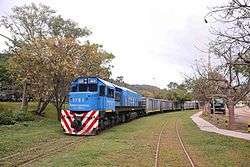Belgrano Cargas y Logística
|
| |
|
| |
| State-owned | |
| Industry | Rail transport |
| Predecessor |
Belgrano Cargas América Latina Logística |
| Founded | 2013 |
| Founder | Government of Argentina |
| Headquarters | Buenos Aires, Argentina |
Area served | Centre and North of Argentina |
Key people |
Guillermo Dietrich (Ministry of Transport) Ezequiel Lemos (President)[1] |
Production output | 3,155,301 tonnes carried (2014)[2] |
| Services | Rail freight transport |
| Total assets | 86 locomotives, 4,720 wagons[3] |
| Owner | Government of Argentina |
Number of employees | 3,740[4] (2013) |
| Parent | Ferrocarriles Argentinos S.E. |
| Divisions |
Belgrano R Urquiza R San Martín R |
| Website | bcyl.com.ar |
Belgrano Cargas y Logística S.A. (trading name: Trenes Argentinos Cargas)[5][6][7] is an Argentine State-owned company which operates a 15,305 km (9,510 mi) freight rail network that includes Belgrano, Urquiza and San Martín railways.[4][8] It is a subsidiary of the Ferrocarriles Argentinos holding company.
The company is formed by three shareholders, Operadora Ferroviaria Sociedad del Estado and the Administración General de Puertos (General Ports Administration).[9]
It is often erroneously called Belgrano Cargas by the Argentine government and press, despite the freight network encompassing numerous other Argentine railways, of which the General Belgrano Railway is only one.[10]
Overview
The network extends through the provinces of Buenos Aires, Santa Fe, Córdoba, Mendoza, Santiago del Estero, San Juan, La Rioja, Catamarca, Tucumán, Chaco, Formosa, Salta and Jujuy. The line also reaches all the Argentina's neighbouring countries, such as Bolivia, Uruguay, Brazil, Chile and Paraguay.[3]
TACyL currently operates 122 locomotives and 7,392 goods wagons,[4] employing 3,140 workers whose jobs are guaranteed by the National government. In 2007, its predecessor Belgrano Cargas had transported nearly one million tonness of merchandise, a figure which increased to over 3 million tonnes in 2014 following nationalisation.[3][2]
History

In 2008, the Government of Argentina ceased the concession granted to Belgrano Cargas S.A. to operate the 7,347 km. of Belgrano Railway's freight network. "Belgrano Cargas y Logística" was established in May 2013 by National decree,[11] to take over Belgrano's freight services, formerly operated by Belgrano Cargas. In June that same year the company also took over some services from Urquiza (2,704 km) and San Martín (5,254 km) railways.[12][13]
That same year the National Government also rescinded the contract signed with América Latina Logística (ALL), taking over the services previously granted to the company, such as Urquiza and San Martín freight services that had been managed by ALL until then.[14] The Government alleged that ALL had not complied with the terms of the contract, previously noted by the General Auditing Office of Argentina.[15]
Soon after nationalisation, the government began looking to expand the fleet of the company and began making orders both domestically and abroad. One order consisted of 1000 freight wagons from Argentine state-owned company Fabricaciones Militares.[16] The company also ordered 100 locomotives and 3,500 carriages from China as part of a plan that also included the purchase of 30,000 rails to repair parts of the line.[17]
In September 2015, the Government of Argentina announced the completion of the 100 new diesel locomotives by Chinese CRRC Corporation, being the first locomotives purchased exclusively for freight transport in Argentina.[18] Later that month the Ministry of the Interior and Transport, together with China Machinery Engineering Corporation, announced that the original Chinese investment of US$ 2.4 billion in the Argentine freight network was being doubled to US$ 4.8 billion and new purchases and infrastructure projects would ensue.[19]
In August 2016, the first brand-new locomotive manufactured by CRRC was finished, as part of a total of 20 units that will be export to Argentina.[20]
See also
- Belgrano Cargas (former freight company)
- Ferrocarriles Argentinos (2015)
- Rail transport in Argentina
- San Martín Railway
- Urquiza Railway
- Belgrano Railway
References
- ↑ "Perfil de los funcionarios de Dietrich para Ferrocarriles". En el Subte. 9 December 2015.
- 1 2 "7,1% menos de carga transportada por ferrocarril en el 2014". Bolsa de Commercio de Rosario. 13 February 2015.
- 1 2 3 "Nuestra flota". Belgrano Cargas y Logística.
- 1 2 3 "Estadísticas del transporte ferroviario - Total 2014". CNRT - Ministry of Transport. Archived from the original on 2015-06-12.
- ↑ "Trenes Argentinos Cargas Y Logística". Trenes Argentinos Carga Y Logística blog. 9 June 2014.
- ↑ Mascarini, Marcelo (3 June 2014). "Nuevo nombre de Belgrano Cargas y Logística". Esperando Vía.
- ↑ "Nació una nueva marca: Trenes Argentinos Operadora Ferroviaria". RielFM. 7 June 2014.
- ↑ "Nuestra red". Belgrano Cargas y Logística.
- ↑ Lukin, Tomás (23 May 2013). "Nueva empresa estatal para el Belgrano Cargas". Página/12.
- ↑ "El “Belgrano Cargas”, ese nombre que designa todo y significa nada". EnElSubte. 13 October 2015.
- ↑ "National Decree N° 566/2013". Infojus. 23 May 2013.
- ↑ "Boletín Oficial de Argentina N° 32.644". Archived from the original on 13 July 2015.
- ↑ "Belgrano Railway returns to state control". Railway Gazette International. Retrieved 12 February 2013.
- ↑ "Resolución 469/2013 Ministerio del Interior y Transporte" (PDF). InfoJus. 5 Jun 2013.
- ↑ "Randazzo anunció que le rescinden el contrato a All y estatizan el Tren de la Costa". La Política Online. 4 June 2013.
- ↑ "Fabricaciones Militares construirá más de 1000 vagones para el Belgrano Cargas". Fabricaciones Militares. Archived from the original on 2015-05-09.
- ↑ "Avanza la renovación del Belgrano Cargas con financiamiento chino". Telam. 14 February 2015.
- ↑ "Desde China, Florencio Randazzo presentó la primera locomotora de carga fabricada para Argentina". La Nación. 6 September 2015.
- ↑ "Duplicarán el crédito chino para cargas: invertirán más de 4800 millones de USD". EnElSubte. 14 September 2015.
- ↑ "Empresa china terminó la primera locomotora diseñada para el Belgrano Cargas", Telam, 31 Aug 2016
